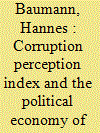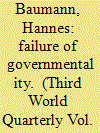| Srl | Item |
| 1 |
ID:
165177


|
|
|
|
|
| Summary/Abstract |
Forty years ago, Salim Nasr identified a “crisis of Lebanese capitalism” as a “backdrop” to the country’s civil war. Thirty years after Taif, Lebanese capitalism is facing another crisis: public debt, a looming currency crisis, failing public services. Explanations that focus solely on the sectarian “weak state” or on Syrian refugees neglect the crucial importance of Lebanon’s dependence on Gulf rentierism. Using recent studies of income and poverty, this article shows how postwar capitalism benefited rentier capitalists at the top, created a precarious middle class, and perpetuated poverty. Economic protests mobilize the precarious middle and they revolve around failing public services.
|
|
|
|
|
|
|
|
|
|
|
|
|
|
|
|
| 2 |
ID:
176025


|
|
|
|
|
| Summary/Abstract |
The corruption perception index (CPI) compiled by Transparency International (TI) ranks countries by perceived levels of corruption. It is a reformist rather than a radical form of ‘statactivism’. First, I use Rose and Miller’s analytical framework to explain how corporate concerns come to dominate the CPI: How a neoliberal rationality is translated into a programme to govern corruption and then a technology – the CPI. A comprehensive survey of sources used to compile the CPI 2001–2016 shows that the vast majority were either produced for sale to corporate clients or were based on surveys of business elites. Second, I embed the index’s production into a wider political economy: TI workers are Gramscian intellectuals who put forward an interpretation of corruption that is non-threatening to corporate capital. This Gramscian framework holds wider relevance for analyses of the politics of global benchmarking.
|
|
|
|
|
|
|
|
|
|
|
|
|
|
|
|
| 3 |
ID:
127032


|
|
|
| 4 |
ID:
151507


|
|
|
|
|
| Summary/Abstract |
This article critiques the Foucauldian approach to governance indicators. Transparency International’s (TI) Corruption Perceptions Index (CPI) underestimated Tunisian corruption levels under President Ben Ali: his regime was highly corrupt but foreign investors were less affected. CPI methodology meant it reflected primarily the needs of foreign investors. The Foucauldian approach specifically excludes analysis of governance indicators’ methodologies. It thus fails to demonstrate the effectiveness of governance indicators as a technology of government, and it fails to show how the production of the CPI is embedded in a wider global political economy.
|
|
|
|
|
|
|
|
|
|
|
|
|
|
|
|